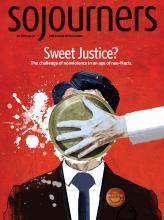CERTAIN STRAINS of consumerism are easy to spot. Think Beverly Hills and walls stacked with brightly colored shoes and purses, like heaps of fresh produce. Closer to home, perhaps, is the caricature of suburban consumption—gas-guzzling SUVs, expensive outerwear.
And then there’s minimalism, an ideology defined by its emphasis on intentional efforts to spend less. At its best, minimalism provides a healthy alternative for people of faith seeking simplicity and thoughtful economic practices. At its worst, the minimalist aesthetic looks an awful lot like the system it was designed to critique—oblivious, privileged, and disconnected from reality.
Read the Full Article

Already a subscriber? Login
